Should we Elope in 2024? Exploring the Pros and Cons
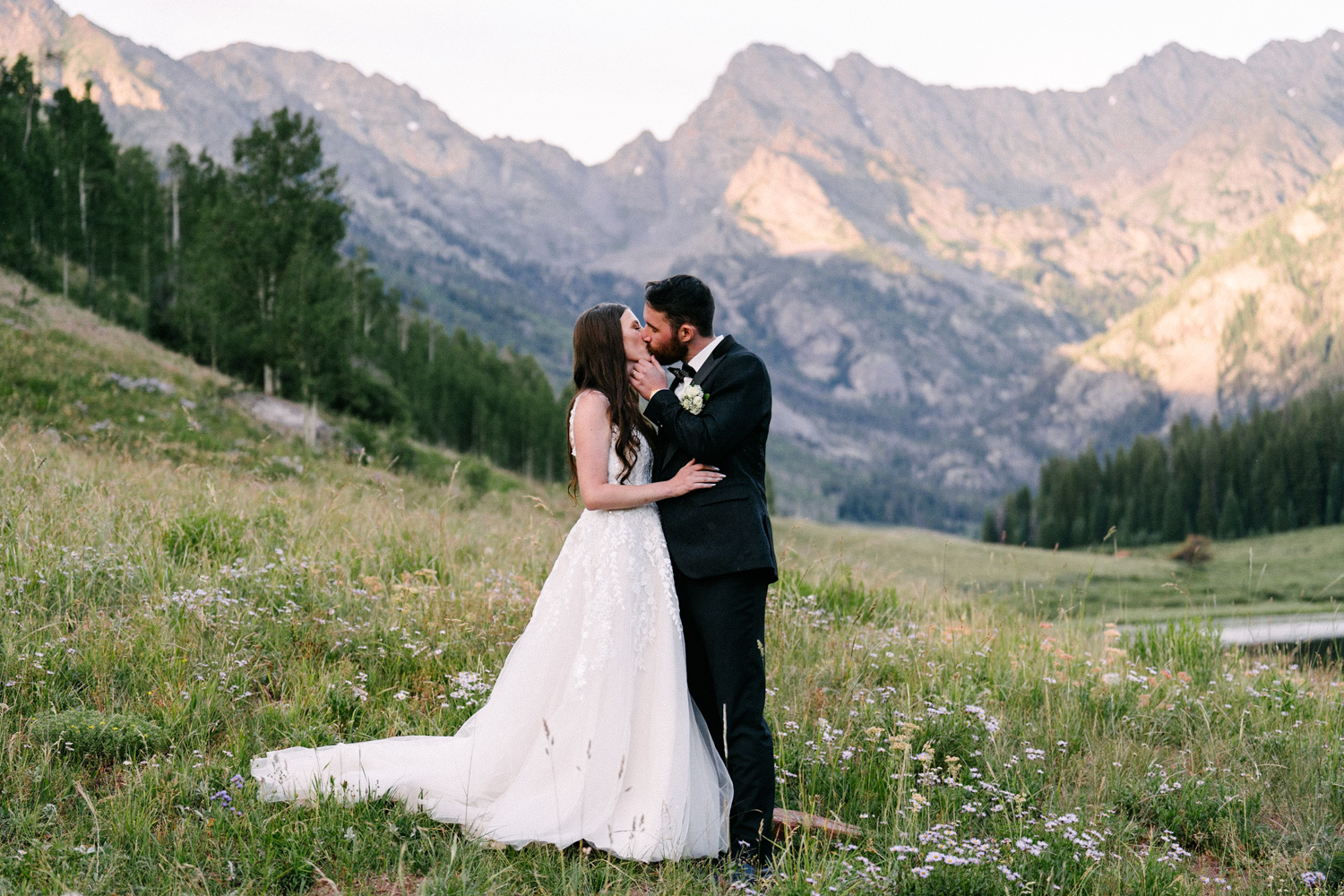
Elopement distills the essence of matrimony to its intimate core. Absent are the expectations and the intricate orchestrations often synonymous with traditional weddings, leaving couples with a singularly personal celebration.
Elopements prioritize the couple’s exclusive experience and desires.
They are a quintessential reflection of commitment, free from the weight of external pressures and the glare of an extensive guest list.
Table of Contents
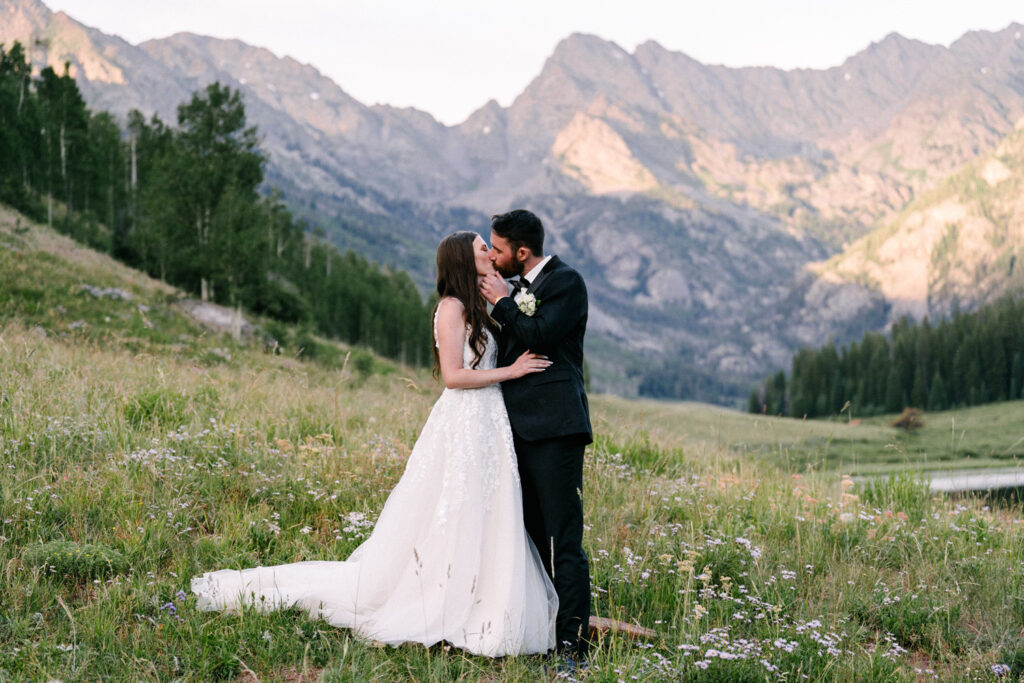
What is an Elopement?
Elopement is the embodiment of nuptial simplicity and personal significance. It discards the customary spectacle in favor of an authentic, shared moment between partners.
In essence, elopement strips away the pageantry associated with conventional weddings, enabling couples to solemnly and authentically commit to one another in a setting of their choosing, without the gaze of a large audience.
The term “elopement” has evolved, now reflecting a spectrum of intimate ceremonies that place the couple’s unique narrative at the forefront.
Elopements are a departure from traditional wedding expectations, allowing couples to prioritize their own desires and experiences. They provide an opportunity for couples to escape external pressures and the spotlight of a large guest list, creating a more intimate and meaningful celebration. By embracing the simplicity of elopements, couples can focus on the authenticity of their commitment and create a shared moment that truly reflects their love and partnership.
Unlike conventional weddings, elopements remove the grandeur and pomp, enabling couples to exchange vows in a setting that holds personal significance to them, away from the scrutiny of a large audience.
The term elopement has evolved to encompass a range of intimate ceremonies that highlight the couple’s unique story and allow them to celebrate their love in a way that feels true to them. Elopements have become a departure from traditional wedding expectations, allowing couples to prioritize their own desires and experiences. They offer a chance for couples to escape external pressures and the spotlight of a large guest list, creating a more intimate and meaningful celebration.
By embracing the simplicity of elopements, couples can focus on the authenticity of their commitment and create a shared moment that truly reflects their love and partnership. Unlike conventional weddings, elopements eliminate the grandeur and pomp, enabling couples to exchange vows in a setting that holds personal significance to them, away from the scrutiny of a large audience.
The term elopement has evolved to encompass a range of intimate ceremonies that highlight the couple’s unique story and allow them to celebrate their love in a way that feels true to them.
Traditional Weddings vs. Eloping
Traditional weddings celebrate with grandeur—vivid displays of culture and communal joy marking a public declaration of union.
On average, elopements can cost 90% less than traditional weddings, embracing economic sensibility alongside romantic intimacy.
As elopements focus on the couple’s personal narrative and connection, couples often find that the reduced scale enhances the significance of shared moments and vows.
Elopements eschew the extensive guest list and complex logistics, offering a tranquil and heartfelt alternative to conventional celebrations, rooted deeply in individual authenticity.
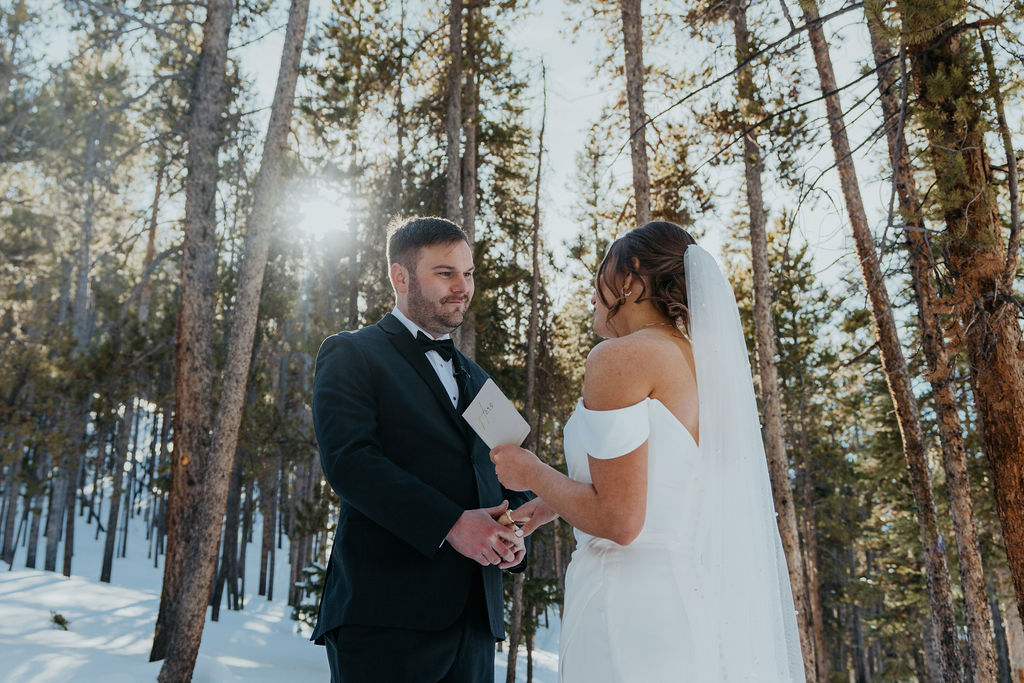
Key Characteristics of Elopements
Elopements embody a minimalist ethos, focusing squarely on the couple’s bond rather than opulent embellishments.
In contrast to expansive nuptials, elopements prize seclusion, often set amidst the natural splendor of locations like Colorado’s Rocky Mountains, where privacy amplifies the ceremony’s emotional resonance.
With an elopement, the administrative prerequisites remain similar to traditional weddings, but the execution is decidedly more streamlined—fewer guests equates to less complexity in planning and logistics.
The flexibility inherent in elopements allows for a focus on the couple’s storyline, genuinely highlighting personal elements like preferred themes, vows, and spiritual beliefs without external pressures.
While elopements can be deeply personal and meaningful, they are not suited for every couple, especially those who value the presence of a broader community on their special day.
Pros of Elopement
Eloping often signifies a heartfelt, profound commitment where the couple seeks profound intimacy, circumventing the distractions of a conventional celebration. Stripping away non-essential elements, it facilitates an environment where the essence of the union takes center stage, unsupported by extraneous observances. Moreover, it can be substantially more economical, bypassing the substantial expenses typically associated with more extensive ceremonies.
The flexibility of elopements allows couples to focus on their unique story, incorporating personalized elements such as themes, vows, and spiritual beliefs. While elopements can be deeply meaningful, they may not be suitable for couples who desire a larger community presence on their wedding day. Pros of elopement include a heartfelt commitment that prioritizes intimacy and the essence of the union, free from the distractions of a traditional celebration. Additionally, elopements can be more cost-effective compared to elaborate ceremonies.
Whether it’s exchanging vows under a Colorado sunset or alongside a serene mountain stream, elopements grant the freedom to create a uniquely tailored matrimonial experience.
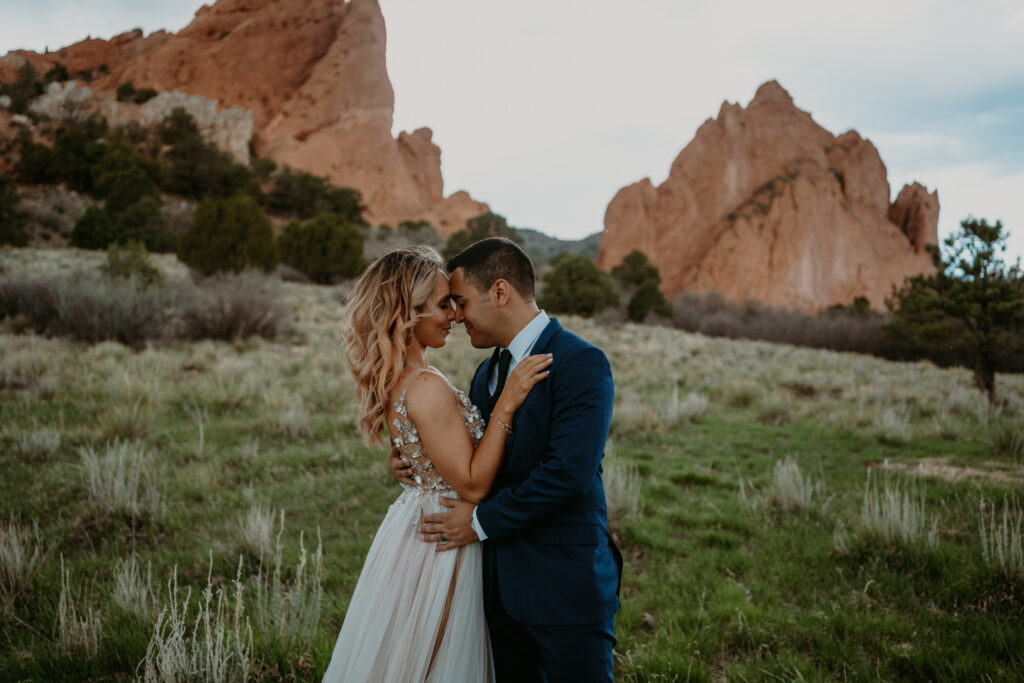
Financial Savings
Elopements inherently benefit from economic leniency. By forgoing large-scale events, couples unlock substantial cost reductions in their wedding plans.
The reduction in guest numbers typically correlates to a decrease in venue, catering, and decoration costs. Funds ordinarily allocated for a grand celebration can be diverted, allowing for a more luxurious honeymoon, a stronger financial foundation for martial life, or investment into long-term aspirations such as home ownership. By embracing an elopement, fiscal resources are refocused to nurture the couple’s future rather than a single day’s festivities.
Furthermore, the logistical simplifications that accompany elopement contribute to monetary savings. Without the complexities of large-scale event planning, couples often bypass the need for elaborate vendors and planners. This streamlined version of nuptials not only decreases financial strain but also considerably reduces the time and stress involved in orchestration.
For many, the prospect of allocating funds toward lifelong experiences over one-day extravaganzas aligns with prudent financial philosophies. By electing to elope, couples may experience a more intimate celebration while also honoring their economic sensibilities. This balance affords them the luxury of beginning their union without the burdensome debt that often accompanies traditional weddings, providing a clear financial trajectory for the nascent marriage.
Intimacy and Simplicity
Elopements capture the essence of matrimonial vows with a focus on the couple’s bond, eschewing the fanfare for more heartfelt moments. This heightened level of privacy fosters genuine, unguarded emotional exchanges between partners.
More than a ceremony, it’s an intimate experience. Planning stress diminishes as the couple’s preferences take center stage, unperturbed by external pressures or expectations. This lends itself to an authentic expression of love, where the spotlight remains solely on the union of two souls.
Eliminating the distractions of a conventional wedding places emphasis on the significance of the commitment being made. Couples who choose to elope often find this distilled environment creates a sanctuary where the profundity of their promises resonates more intensely. Moments become keepsakes, far from the public gaze, preserved for only those who play a part in the story.
For couples contemplating an elopement, weigh the allure of a simplified ceremony against the exclusion of family and friends. The scale of the gathering can be as small as the couple alone, or include a handful of loved ones, enabling them to craft an experience that embodies the essence of their relationship. It’s a deliberate choice, a celebration designed to honor the depth of their connection with the utmost respect for their shared vision.
Flexibility and Adventure
Exploration of new horizons beckons.
An elopement inherently infuses your union with a spirit of adventure. Couples are drawn to this as it offers the freedom to select unconventional locations, free from the constraints of traditional venues. It’s a canvas for creativity, inviting you to immerse your nuptials in settings that reflect your joint passions and personalities. Furthermore, the date and time can be chosen with complete autonomy, unbound by the scheduling conflicts often associated with conventional weddings.
Decide spontaneously – and the world is your backdrop.
You choose where the winds of matrimony take you – be it a mountaintop at dawn, a secluded beach at sunset, or amidst the grandeur of ancient ruins. The intimacy of an elopement allows for a true adventure that is as unique as your relationship, inviting a deep connection with your surroundings and each other during your sacred exchange of vows.
Locations can be remote or urban, igniting excitement.
With a scope as broad as your imagination, envision exchanging vows on the peaks of the Rockies, within the lush Aspen forests, or beside the rippling streams of a serene mountain valley. Aspiring for a 2023 elopement promises an unforgettable experience and a deeply personal journey through which you’ll craft memories that reverberate profoundly in the tapestry of your lives together. This latitude provides a rare opportunity to intertwine your love story with the natural wonders that Colorado has to offer.
Elopement Drawbacks to Consider
Eloping may mean a smaller guest list, potentially leaving out dear friends or family members whose presence may be missed on such a significant day. Limitations in sharing the immediacy of the celebration with a wider circle, can at times, lead to feelings of regret or disconnect for some couples who highly value communal experiences.
The simplicity of elopement logistics often belies the absence of traditional wedding elements that may hold sentimental value, such as a bridal procession or formal receptions that honor family customs. Not all desires can be fulfilled within the stripped-down framework of an elopement.
Limited Guest List Dilemmas
Crafting a guest list for an elopement can be one of the most challenging aspects of planning your intimate ceremony.
- Emotional Impact: Excluding close friends or relatives may lead to unforeseen disappointment or hurt feelings.
- Intimate vs. Inclusive: Balancing the desire for a private ceremony with the wish to celebrate with a broader network can be difficult.
- Family Dynamics: Navigating family expectations and traditions can complicate the decision-making process.
- Future Regrets: Some couples worry they might regret not having more loved ones witness their vows over time.
A limited guest list inherently means some individuals will not partake in your union’s live celebration.
The decision to elope with few, if any, guests should be weighed against the potential for lasting impact on personal relationships.
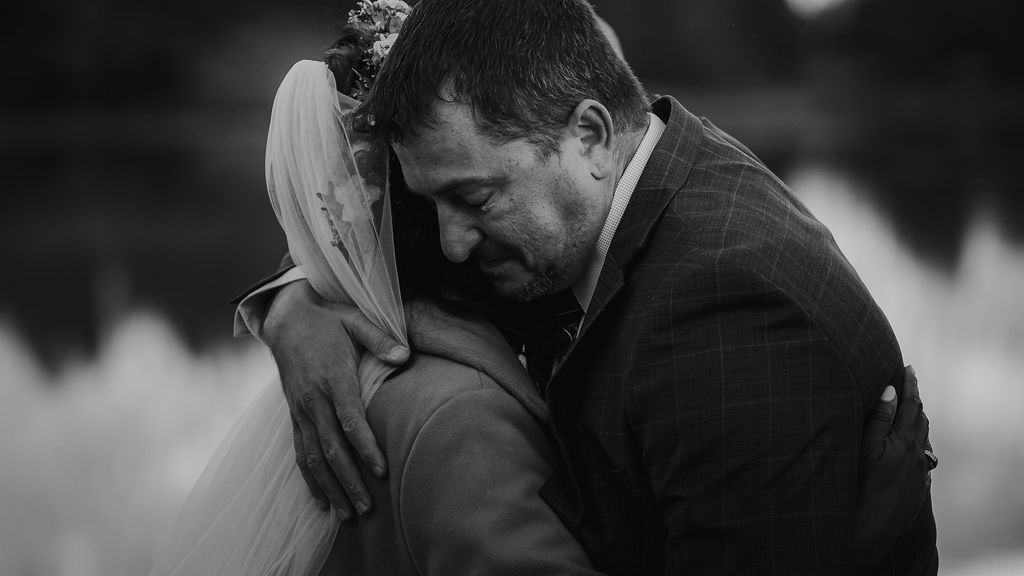
Potential Family Tensions
Eloping may inadvertently create friction within family dynamics, particularly if relatives hold traditional views on marriage ceremonies.
While a wedding is a joyous occasion, the method of celebration can sometimes set the stage for familial discord. The choice to elope, often perceived as unconventional, might be seen as exclusionary or dismissive of family involvement.
Family members may carry expectations rooted in cultural, religious, or personal values that envision a shared, public declaration of union. Your elopement might be interpreted as a deviation from these deeply held traditions, leading to potential misunderstandings or feelings of alienation.
Addressing these tensions early through candid discussions can mitigate misunderstandings, yet the decision may nonetheless leave some relatives feeling sidelined. Balancing the intimacy of elopement with familial expectations requires delicate navigation and empathetic communication.
Ultimately, each couple must assess the importance of family dynamics within the context of their elopement plans. Prioritizing your wishes for your special day may sometimes be at odds with the desires of family members.

Missing Out on Wedding Traditions
Elopements, by design, sidestep many time-honored wedding conventions that have been embraced across generations. This conscious decision to forgo such customs can be both liberating and poignant for couples contemplating elopement over a traditional wedding.
For some, the absence of these rituals – from the exchange of vows witnessed by a congregation of loved ones to the celebratory first dance – can induce a sense of loss or wistfulness. These time-tested traditions offer a sense of continuity and connection, sewing the fabric of family history tighter with each successive union. Straying from these practices might leave a couple feeling detached from their roots or cultural heritage.
Conversely, the decision to elope can also be viewed through the lens of creating new traditions. In choosing a path less trodden, couples can craft a ceremony that is uniquely theirs, unbound by the expectations and formalities that accompany conventional weddings. This freedom allows for intimate, personalized experiences that hold special significance to the betrothed pair.
Yet, it’s imperative to recognize that for some relatives, your elopement might challenge their perception of how matrimonial ceremonies should unfold. Navigating these waters can be delicate, particularly when times of celebration are traditionally times of family gathering. Your choice might beget a measure of disappointment among those who envisioned witnessing and participating in this milestone. Striking a balance between honoring your wishes and acknowledging the weight of tradition is a nuanced and personal journey for each couple.
How is eloping different from marriage?
Eloping differs from a traditional marriage in several key ways. Eloping typically involves a spontaneous or intimate ceremony, often with just the couple or a few close witnesses, whereas a traditional marriage usually includes a larger celebration with family and friends. Eloping focuses on the couple’s personal experience and often involves travel to a special location, while traditional weddings emphasize family and community involvement. Additionally, eloping can be more cost-effective and stress-free, avoiding the complexities and expenses of a large wedding.
Deciding if Elopement is For You
Elopement, once a term synonymous with secrecy and haste, has evolved into a celebration of intimacy and intentionality. It’s a choice that embodies the essence of marrying for yourselves, an act of devotion undiluted by the spectacle of grandiose events. Before embracing this path, consider deeply the value you place on privacy in your union, and reflect on how a quieter affirmation of your commitment aligns with your personal ideals.
In making this pivotal decision, weigh the allure of a tranquil, bespoke affair against the joy of a traditional event teeming with friends and family. Elopement is a canvas for authenticity, offering a serene backdrop against which your unique love story can unfold unscripted. It demands a fearless approach to tradition and often involves traversing the emotional terrain of family expectations. As custodians of your own narrative, it is vital to assess your readiness to forgo those conveniences and milestones that a larger wedding provides, ensuring that your chosen mode of celebration resonates with your collective heart.

Personalizing Your Experience
Elopement stands out as the epitome of a bespoke matrimonial celebration. Its essence lies in the liberty to craft a day that reflects the couple’s unique character and preferences.
In the realm of elopements, Colorado’s vast landscapes serve as a canvas for personalization, allowing couples to select locales that resonate with their story. Whether it’s an alpine lake at dawn or a rugged mountaintop at sunset, the venue becomes an intimate portrayal of their journey.
Tailoring your elopement to your tastes extends beyond location. Attire, vows, and rituals can all be customized to create a ceremony that speaks to the heart of who you are as a couple. The absence of a guest list frees you from conforming to expectations that may not align with your vision.
With the flexibility to incorporate unique elements, you could exchange vows under a canopy of stars or beside a whispering stream. These distinctive choices forge an indelible memory that bears the hallmark of your personal touch.
Remember, the intimate scale of an elopement does not diminish its significance but rather amplifies the profound nature of your commitment. Every detail can symbolize your love’s distinct narrative.
Weighing Emotional Impacts
Elopement treads a fine line between intimate celebration and the possible perception of exclusion among family and friends.
- Intimacy Amplified: Elopement often enhances the emotional connection between the couple, focusing purely on their bond.
- Potential for Disappointment: Close relatives may feel hurt or left out, which can require sensitive communication.
- Exclusive Memories: The couple creates profoundly personal memories, which may not be shared widely with others.
- Freedom from Performance Anxiety: Many people experience heightened stress during large ceremonies; elopements can alleviate this feeling.
By opting for an elopement, a couple can honor their unique narrative without the pressure of an audience.
This form of union calls for careful consideration of the intertwined emotional threads within one’s personal circle.

Legal Considerations
Elopements carry distinct legal considerations that must be meticulously addressed.
- Marriage License: Obtainment varies by county; ensure understanding of local requirements.
- Witness Requirements: Some locations mandate the presence of one or more witnesses.
- Officiant Guidelines: Verify the officiant’s authority to perform a legally binding ceremony in Colorado.
- Name Change Process: If applicable, understand the steps for legally changing your name post-ceremony.
- Residency Requirements: Most Colorado counties do not have residency stipulations, but always double-check.
- Waiting Periods: Familiarize yourselves with any mandatory waiting periods between license issuance and the ceremony.
- Marriage Certificates: Post-elopement, acquiring certified copies of your marriage certificate is crucial for legal purposes.
Ensure compliance with all legal requisites to validate your Colorado elopement.
It is essential to navigate these legalities with forethought and precision to safeguard the legitimacy of your matrimony.
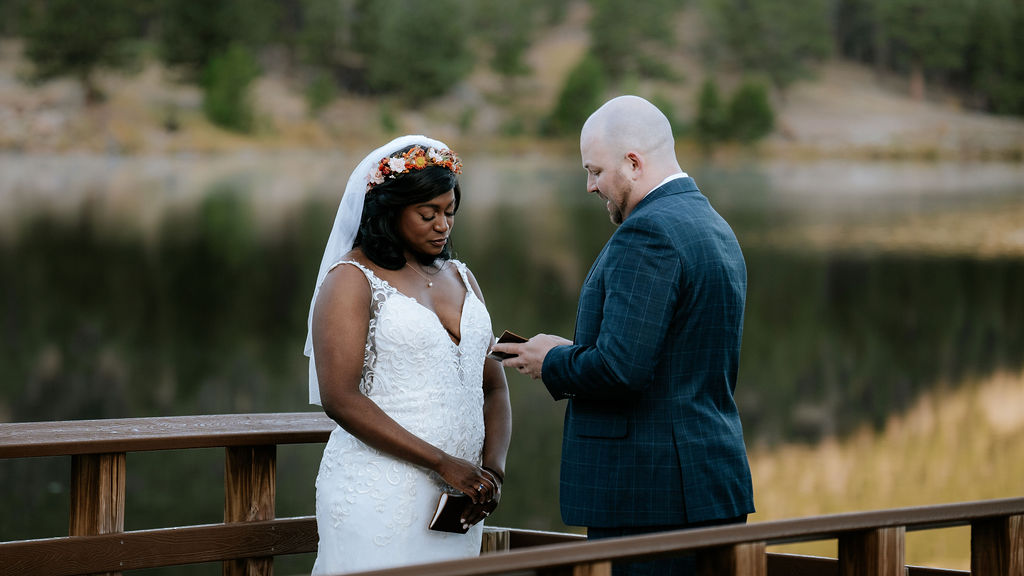
How to elope
Eloping can be an incredibly romantic and intimate way to tie the knot. Here’s a step-by-step guide to help you plan a beautiful elopement
Choosing the perfect location is crucial. Whether it’s a scenic mountain range, a picturesque beach, or a charming cityscape, the location sets the tone for your elopement. In Colorado, the Rocky Mountains offer stunning vistas and secluded spots perfect for an intimate ceremony.
2. Set a Budget
Even though elopements are generally more budget-friendly than traditional weddings, setting a budget is essential. Consider costs for travel, accommodation, photography, attire, and any other special touches you want to include.
3. Choose a Date
Select a date that holds special meaning for both of you. Check the weather and seasonal conditions for your chosen location to ensure the best experience.
4. Hire an Experienced Photographer
Capturing the moments of your elopement is just as important as the day itself. Hiring a professional photographer who specializes in elopements will ensure you get stunning photos that reflect the intimacy and beauty of your day. In Colorado, look for a photographer familiar with mountain weddings and elopements.
5. Plan the Ceremony
Decide on the details of your ceremony. Will you write your own vows? Do you want to include any traditions or rituals? Consider hiring an officiant, or ask a close friend or family member to get ordained and officiate your ceremony.
Ensure you meet all legal requirements for marriage in your chosen location. This includes obtaining a marriage license and any necessary permits for your ceremony site.
7. Select Attire
Choose attire that complements your location and personal style. Whether it’s a flowing dress and comfortable shoes for a mountain hike or a stylish suit for a city elopement, make sure it’s something you’ll be comfortable in.
Even though it’s an elopement, you can still have a celebration. Plan a special dinner, a mini-reception, or a fun activity to mark the occasion.
9. Inform Loved Ones
Decide how and when you want to inform your loved ones about your elopement. Some couples choose to keep it a surprise until after the ceremony, while others share the news beforehand.
10. Enjoy the Moment
Above all, remember to enjoy every moment. An elopement is about celebrating your love in a way that feels right for you. Embrace the adventure and make memories that will last a lifetime.
Eloping can be a beautiful, stress-free way to start your married life together. With thoughtful planning and the right guidance, your elopement can be everything you’ve dreamed of and more.
If you need more specific advice or have questions about planning your elopement in Colorado, feel free to reach out. I’m here to help you create the perfect day!
Check out some of my location guides to help start planning your elopement!
- Breckenridge Elopement
- Thailand Elopement
- Colorado Fall Elopement Guide
- Boulder Elopement
- Aspen Elopement
- Estes Park Elopement
- Crested Butte Elopement
- Telluride Elopement
- Saun Juan Mountain Elopement
FAQ
How is eloping different from marriage?
Eloping is a type of marriage where the couple gets married without traditional ceremonies or involving many guests.
Is it OK to just elope?
Yes, it is okay to elope.
What does elope mean legally?
To elope legally means to get married without obtaining the required legal permissions or fulfilling the typical formalities associated with marriage.
Why is it called eloping?
Eloping is often associated with getting married in a private or secretive manner, without the usual elaborate wedding ceremony and celebrations. The term elope originally referred to a couple running away together without parental consent to get married. Over time, it has evolved to include any type of small-scale wedding that is typically done spontaneously or without much planning.